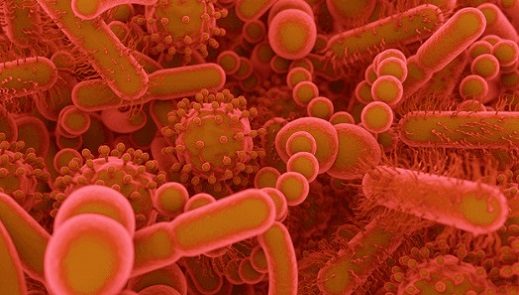Nikhil Prasad Fact checked by:Thailand Medical News Team Feb 13, 2025 2 months, 1 day, 5 hours, 45 minutes ago
Medical News: Understanding the Threat of Nontuberculous Mycobacteria
Nontuberculous mycobacteria (NTM) infections have been increasingly recognized as a major health concern, particularly in developed countries such as the United States. Unlike Mycobacterium tuberculosis, which causes tuberculosis (TB), NTM is commonly found in natural environments like soil, water, and food. While most people are not affected by these bacteria, a growing number of individuals are developing lung infections caused by NTM, leading to significant health complications.
 Rising Concerns Over Nontuberculous Mycobacteria Infections and COVID-19
Rising Concerns Over Nontuberculous Mycobacteria Infections and COVID-19
This
Medical News report highlights the growing prevalence of NTM infections and their potential interaction with COVID-19. With the recent emergence of the coronavirus pandemic, researchers have sought to understand how preexisting lung conditions, such as those caused by NTM, may increase the severity of COVID-19 and influence patient outcomes.
Key Findings of the Research
A recent editorial published in Frontiers in Cellular and Infection Microbiology delves into the latest research on NTM infections and their relationship with COVID-19. The editorial, authored by Vishwanath Venketaraman from the Department of Basic Medical Sciences at Western University of Health Sciences, California-USA, examines how NTM diseases impact lung health and immune responses, particularly in individuals infected with SARS-CoV-2.
One of the key takeaways from the research is that NTM primarily affects individuals with bronchiectasis, a condition that damages the lung's airways. Unlike TB, which is strongly linked to immunocompromised conditions like HIV, NTM-related diseases in HIV patients tend to present as extrapulmonary infections rather than lung infections. This difference in disease presentation highlights the unique behavior of NTM within the human body.
The study also explores how SARS-CoV-2 exacerbates inflammatory responses in the body. When COVID-19 infection is combined with NTM, the inflammatory burden may significantly increase, leading to more severe lung damage. Scientists believe that this dual infection could complicate treatment strategies, making it crucial to develop targeted therapies for patients suffering from both conditions.
Novel Diagnostic and Treatment Strategies
Accurate and early diagnosis of NTM infections is essential for effective treatment. One study referenced in the editorial, conducted by researchers from Temple University and Abilene Christian University, investigated cytokine expression in patients with NTM infections. Their findings suggest that Mycobacterium avium subspecies paratuberculosis (MAP) infections persist over time, indicating a chronic state of infection.
Another promising diagnostic approach involves the use of nucleotide matrix-assisted laser desorption/ionization time-of-flight mass spectrometry (MALDI-TOF-MS). This method has shown a 91.64% accuracy rate in identifying mycobacterium species from clinical samples. Given that mixed infections were f
ound in nearly 19% of the tested samples, improving diagnostic accuracy is critical for ensuring appropriate treatment.
The Role of COVID-19 in Aggravating NTM Infections
COVID-19 has been linked to hyperinflammation and excessive immune activation, which can worsen endothelial cell dysfunction. In one study, researchers tested the effects of two potential treatments, N-acetylcysteine and Sulodexide, on coronary artery endothelial cells affected by COVID-19. The findings suggest that both compounds reduce inflammation and may protect the cardiovascular system from post-COVID complications.
In another study conducted across multiple intensive care units in China, researchers found that heatstroke-related lung infections often involved pathogens such as Klebsiella pneumoniae, Staphylococcus aureus, and Pseudomonas aeruginosa. These findings provide valuable insights into the types of secondary infections that can arise in critically ill patients, particularly those with underlying lung conditions like NTM disease.
Potential Implications for Future Treatments
The research on NTM infections and COVID-19 underscores the importance of developing effective treatment strategies. One promising approach is targeting inflammatory pathways common to both conditions. For example, findings suggest that interleukin-17 (IL-17) levels are elevated in both tuberculosis and NTM infections, which could make IL-17 a useful biomarker for diagnosing and managing these diseases.
Additionally, the combination of traditional diagnostic methods with newer molecular techniques, such as MALDI-TOF-MS, could improve early detection rates and help clinicians make more informed treatment decisions. As more studies emerge, researchers hope to develop targeted therapies that address the specific immune responses triggered by NTM infections and COVID-19.
Conclusion
Nontuberculous mycobacteria infections pose a significant and growing threat, particularly as they interact with emerging infectious diseases like COVID-19. Research suggests that individuals with preexisting lung conditions may be at a higher risk of severe complications if they contract SARS-CoV-2. Given the increasing prevalence of NTM infections in the developed world, more research is needed to improve diagnostic techniques and develop targeted treatment options.
Understanding the intricate relationship between NTM and COVID-19 is crucial for healthcare providers worldwide. As scientists continue to uncover new findings, public health measures must be updated to reflect these insights. The development of novel treatments, such as anti-inflammatory drugs and advanced diagnostic tools, will be vital in managing these infections and reducing their impact on global health.
The study findings were published as an editorial in the peer-reviewed journal: Frontiers in Cellular and Infection Microbiology.
https://www.frontiersin.org/journals/cellular-and-infection-microbiology/articles/10.3389/fcimb.2025.1550277/full
For the latest on Nontuberculous Mycobacteria Infections and COVID-19, keep on logging to Thailand
Medical News.
Read Also:
https://www.thailandmedical.news/news/sunday-editorial-covid-19-could-possibly-be-contributing-directly-and-indirectly-to-the-rise-of-tuberculosis-infections
https://www.thailandmedical.news/news/challenges-in-diagnosis-and-treatment-of-atlantoaxial-tuberculosis-a-form-of-spinal-tb
https://www.thailandmedical.news/articles/tuberculosis-tb-news
Follow us on:
https://x.com/ThailandMedicaX
https://www.facebook.com/ThailandMedicalNews
https://bsky.app/profile/thailandmedical.bsky.social
https://gettr.com/user/thailandmedicalnews
https://www.tribel.com/thailandmedical/wall
and 33 other social media platforms
